Chapter 5: What Kind of Danger is Turkey Facing?
Everyone’s expectation from the peace process that was shaped by various contacts and officially began in 2013 was that all the weapons would fall silent. However, at the start of the process in question we regularly reiterated the following warning: No true solution can be reached through negotiations, meetings or persuasion efforts. The PKK will always act in the light of its aim of breaking up the country, with its Leninist and communist ideology and underhanded and bloody tactics, and will never abandon those objectives. If people wish to move toward a genuine and lasting solution, this has to be done through education. There simply is no other way.
Ever since then, the PKK has somehow infiltrated our cities, and its leaders have made their voices heard in a most effective manner, while Öcalan has been praised to the rafters by some of the country’s “White Turks.” Turkey is now perhaps facing a greater danger than ever before. It is these threats we shall be looking at in this chapter.
Secret moves toward “democratic autonomy”
Looking at the period from the official declaration of the Solution Process up to the present day when armed conflict once again flared up, great changes have taken place in Turkey in both political terms and in terms of perception management. It needs to be made clear that these changes are not at all positive for Turkey.
During this period, some writers were quite keen to legitimize talks with Öcalan. Letters from Öcalan were read by circles close to the PKK under the heading of “Mr. Öcalan’s demands,” and this came to be regarded as perfectly normal. Öcalan was easily able to criticize the government, either explicitly or in more guarded language, and these all came to be perceived of as natural consequences of the peace process.
In addition, some leftist writers, politicians and bureaucrats went so far as to say, “It is a good thing that Öcalan exists,” and even found themselves capable of demanding that Öcalan be released, first in guarded terms and then openly. Some journalists went to Qandil and began depicting the bloody terrorists who had been ambushing Turkish troops for years as popular heroes instead.
This sly change of language is nothing other than the harbinger of a grave disaster. This change of language is a portent that the PKK (and elements supported by the PKK) has gone into action using more cunning tactics from the inside, in addition to their usual guerrilla methods. The first portent of this disaster was the local elections held on March 30th, 2014.
The 2014 local elections and the announcement of a cunning tactic
Looking at the preparations for the March 30th, 2014 local elections across Turkey as a whole, the resulting picture is one that should never have emerged, with some parties not planning any election rallies in the Southeast at all. Although they should have been able to go and hold rallies in those areas, opposition parties that should have embraced the people there were unable to go to the Southeast part of Turkey because their safety could not be guaranteed. They were unable to embrace their own people on their own lands.
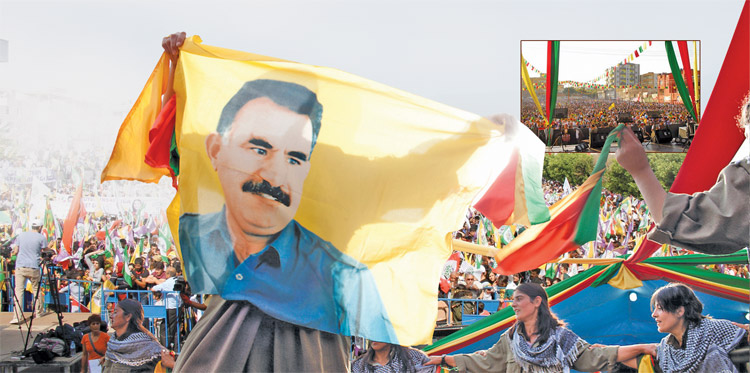 |
| In the Southeast of Turkey, almost no political party can hold a public demonstration with their own party flags. Due to the influence of the fear empire that the PKK found, the Southeastern people cannot attend the demonstrations with Turkish flags; our own flag is almost prohibited by the PKK, which has exerted dominance over the region. |
Even AKP deputies said that they were unable to travel freely in the Southeast, that it was difficult for them to hold rallies, and that party members in district party offices weren’t able to hold welcoming parties. AKP deputy Orhan Miroğlu described the situation in the words, “Fear can get the best of people.”
The measures in question by the opposition parties were also taken during the general election on June 7th, 2015. These precautions were necessary, because they knew that an act of violence against Turkish political parties might come at any moment and that the state was not in full control of the region. A part of their own country was completely closed to the country’s democratic political parties.
This situation still applies in some areas, and is regarded as quite normal by many. A little reflection, however, will reveal the gravity of the situation and the threat that those lands still face.
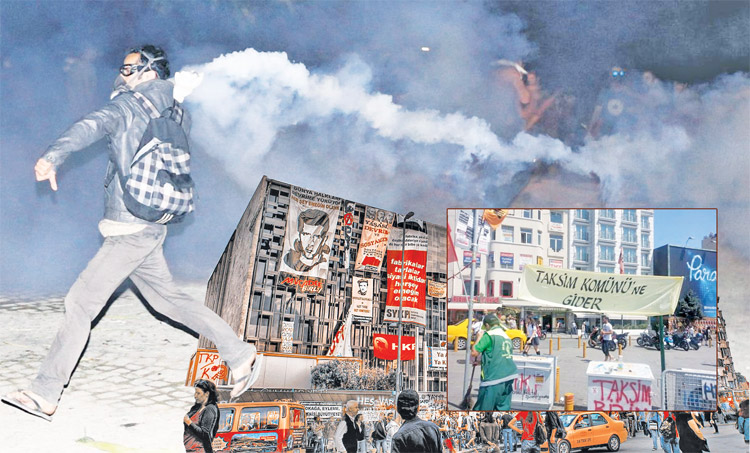 |
| The communist groups also benefited from the democratic protests of environmentalist youth groups during the Taksim Gezi Park protests in 2013. The local elections on 30 March 2014 seemed like a vote of confidence after the protests. But the most serious consequence of this election was that the entire Southeastern part of Turkey was lost to the BDP, the PKK-backed party. “Goes to Taksim commune” |
It is now clear that the local elections of March 2014 meant something more for Turkey, than just local elections. The results of the local elections, which came to represent a vote of confidence in the wake of a year of various uprisings and turmoil, particularly the Gezi Park protests, were of separate significance to each of the parties. In the days that followed the Solution Process, especially with the guarantees given to the Kurdish people, the greatest expectation in the context of the plans for development and regeneration of the Southeast, were that the ruling party or the opposition parties would emerge victorious in the region. Yet that is not what happened.
The fact that BDP municipalities emerged victorious in all the provinces of the Southeast and that the BDP came out on top in cities where the AKP and MHP had once been dominant, sent a highly significant message. Efforts were obviously being made to seize the citadel from the inside; a party openly supported by the PKK had grown stronger. This clearly showed that during the period known as the Solution Process, when PKK militants were expected to lay down their weapons and leave the country, the PKK had not pulled out of the country at all, but was still operating its oppressive system and this time, a very different method for breaking Turkey up was being implemented.
Before moving on to the details, it is very important to make one point quite clear; the BDP, now known as the HDP, is a legal political party within the Turkish democratic system. It possesses the same rights as all other parties in a democracy. It will certainly continue its work as a legally constituted party under the protection of the state. Any physical or verbal attack on this party and its members is a grave blow to democracy and must attract the appropriate legal sanctions.
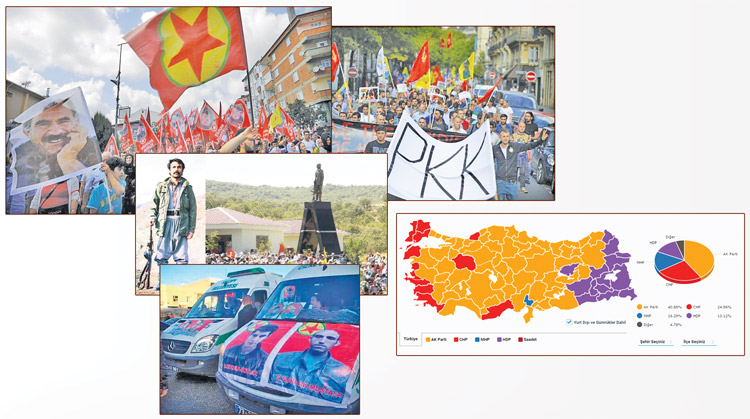 |
| The PKK's insidious activities that aim to lay hold of the cities continued with the efforts to legalize the PKK. During the ceasefire, the erecting of a statue of Mahsum Korkmaz (the first commander of the PKK) and putting up posters of PKK terrorists on municipality buses indicated the severe magnitude of the PKK threat. |
| Following the handing over the Southeastern provinces to the BDP in 2014 local elections, the 2015 general elections yielded worse results. HDP declared its sovereignty over a large area reaching up to Northeastern Anatolia. |
The only reason why we are differentiating the HDP in terms of the Southeast is that this party is supported by the PKK. Indeed, as we shall be seeing in the context of the structure of the KCK, the party in question is most likely under severe pressure from the KCK/PKK. This represents a grave threat to the country. The way that ever since the beginning of the Solution Process, party officials have made frequent references to the subject of autonomy, have shifted their tone with respect to this point and have made great efforts to have legal status granted to Abdullah Öcalan all point to a significant threat. The victory of a party saying such things, particularly in such a region as the Southeast, should rightly lead to serious concerns.
Let us remind ourselves that the 2015 general elections produced an even worse picture in terms of the Southeast. Readers will recall that regions where the HPD emerged as a powerful presence were not limited to the Southeast, but also stretched as far as Ardahan in the Northeast. The reason why we are particularly citing evidence from the local elections here is the dire consequences today, when we are in a time of conflict, of a party backed by the PKK controlling local administrations. We shall be looking at this in detail in due course.
The desire for territory under the name of “democratic autonomy”
The most prominent term in this engineering of perception is without doubt “democratic autonomy.” This expression, which we suddenly began hearing a lot more of after the March 2014 local elections, is in fact a euphemism for fragmentation. It is uttered by politicians who favor breaking the country up in such a saccharine and harmless-appearing way that they even have begun criticizing Turkish people for making it an issue. These people maintain that “democratic autonomy” is a democratic move.
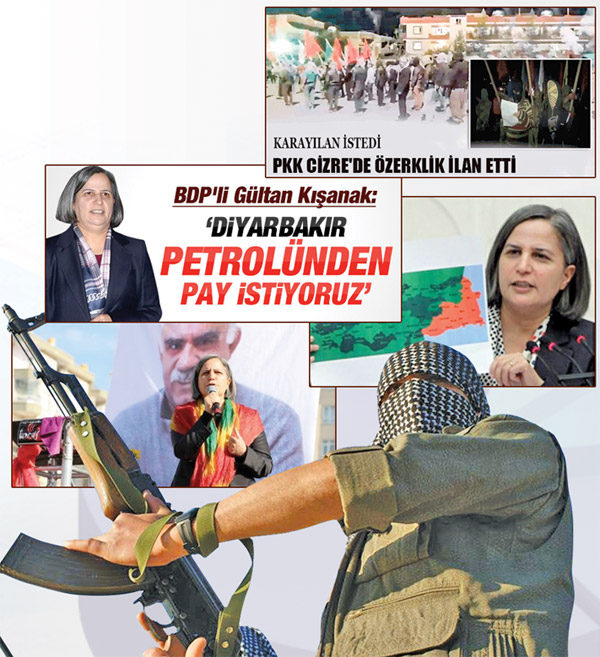 |
| It was not a surprise that in the wake of undemocratic elections held under the shadow of guns, conflicts began and some mayors declared "autonomy" or "self-government". From the beginning, the goal was to conquer the fort from within. |
| "KARAYILAN ASKED THE PKK DECLARED AUTONOMY IN CIZRE" |
| One example of this is the way that, a few weeks after the election, Kurdish politician of the Peace and Democracy Party (BDP) and mayor of Diyarbakır Gültan Kışanak announced that, “We want our share in Diyarbakır’s oil revenues.” |
The fact is, however, that in the language of the PKK, democratic autonomy is not a democratic move at all. Democracy is used as a mask for breaking the country up. In fact, even if the PKK obtained an autonomous state, rather than being founded on democracy, it would be based on communism and a communal system. Indeed, the KCK declaration, which represents the constitution of that imaginary state, sets that out explicitly.
The impression that some circles are trying to give by speaking of democratic autonomy is that “We do not want a direct break-up;” but behind that, they seek to prepare all the factors necessary for fragmentation. The means available to municipalities will particularly be used for that purpose. In other words, those means will be mobilized for communist propaganda.
While the perception engineering, the general lines of which are outlined above, proceeds apace in the wake of the local elections, unexpected and astonishing demands squeezed into that framework are a part of that same stratagem. One example of this is the way that, a few weeks after the election, Gültan Kışanak announced that, “We want our share of the oil revenues.” 75 That was intended to give the impression that an autonomous administration had been established in the Southeast, as in Iraq, and that the autonomous region possessed its own resources, separately from the state. The Southeast region is within Turkey’s national borders, and all resources within those borders, including oil revenues, fall within the country’s national revenues. All revenues obtained are part of the budget shared out among all cities within Turkey’s borders and that extend to all members of the country. In the same way that revenue from oranges grown in Antalya also finds its way to the Southeast, that also applies to oil from the Southeast. That is the result of the indivisible national integrity of the country. This interesting demand by Kışanak serves no other purpose than to attract attention to these words and contribute to the ongoing autonomy project.
It must also be remembered that Kışanak issued a direct demand for autonomy one year prior to the local elections. It was Kışanak who on February 10th, 2013, told daily Hürriyet “We have a straight road: Autonomous Kurdistan”. 76
Indeed, former Mayor of Diyarbakır Fırat Anlı described how this policy of perception was implemented inside cities. Anlı said, “They are already partly implementing this model in the Southeast, district offices and other assembles have been set up, a federation closely resembling independence has developed and they will soon declare autonomy.” 77 Not long after that statement, the PKK resumed its attacks from where it had left off, and municipalities that were almost gifted to the HDP after the local elections one by one shamelessly started to declare autonomy. Although the judiciary took immediate steps, the fact that these displeasing pictures were seen in the Southeast as the result of appeasement should be carefully considered.
This terrible picture in fact announced its own imminent arrival. The danger we have been constantly warning against in recent years is in fact a cunning, illegal and communist state organization that has already been treacherously put into action in Turkey; in other words, the KCK.
An illegal state within a legal one: The KCK
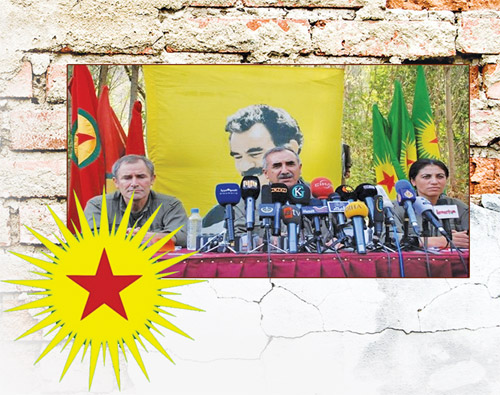 |
| The KCK is a structure recognizing Öcalan as the only leader. All of the public statements made by the KCK Executive Council are carried out in front of Öcalan posters. |
The KCK (Koma Civakên Kurdistan – Union of Kurdistan Communes) is an organization established by the PKK. It set out its aims and the methods it would employ in the document known as the “KCK Contract.”
The document in question describes a state, with its own flag, judiciary and army. The 300-Kongra-Gel serves at the executive, issuing laws and regulations and the executive enforces these. Judicial organs become involved when a problem arises. The KCK is this state organization’s constitution. The units and members of the terror organization (PKK) have systematically assumed their places in this state system. An alternative legislature to the Turkish Parliament has been at work since 2003 and made functional with the KCK organization. 78
The three-part KCK judicial system does not recognize any action the Turkish Penal Code regards as a crime nor the official judicial system of Turkey. In other words, it rejects the Turkish State and its justice system. Instead, it tries people in its own courts under laws invented by itself.
The KCK carries out “bureaucratic appointments” such as “PKK” district governors and “PKK” directors of agriculture in the Southeast of Turkey, and particularly in Diyarbakır. Reports have appeared in the media of the so-called “appointed PKK” officials threatening official district officers of the Republic of Turkey, and questions to the government have been raised in Parliament. 79
The KCK’s army is known by the name of “security units” (YDG-H). These units perform tasks such as collecting taxes in the name of the PKK, forcing businesses to shut up shops as a form of protest, inflicting punishments and pressuring voters and polling stations. These units are used to ensure that fear of the PKK is maintained in the cities and to maintain the threat of violence against citizens. Even while the co-called Solution Process was still continuing, citizens in Diyarbakır were still being forced to pay taxes as “members of the KCK state.” 80
According to the indictment drawn up by the Prosecutor’s Office, Öcalan’s decision to establish a PKK substructure known as the KCK on May 17th, 2005, was inspired by the idea of a suprastate confederated model proposed by the communist/anarchist writer Murray Bookchin. The plan consisted of three stages; a free leadership, democratic autonomy and democratic confederalism. The first aim is thus the release of Öcalan. Looking at the veiled and immoral propositions that are becoming increasingly frequent on this subject in Turkey, work is obviously underway to realize this first step of the plan. The next step once this has been achieved is democratic autonomy, followed by the establishment of a four-part confederated state made up of parts of Turkey, Iran, Iraq and Syria. As can be seen from the term “Establishing a Democratic Socialist Middle East Confederation” in Article 4 of the text, the objective consists not only of the Kurdish regions, but includes the whole of the Middle East. And that goes to show that the basic aim of the PKK is to create a communist order in all the Middle East, Turkey included.
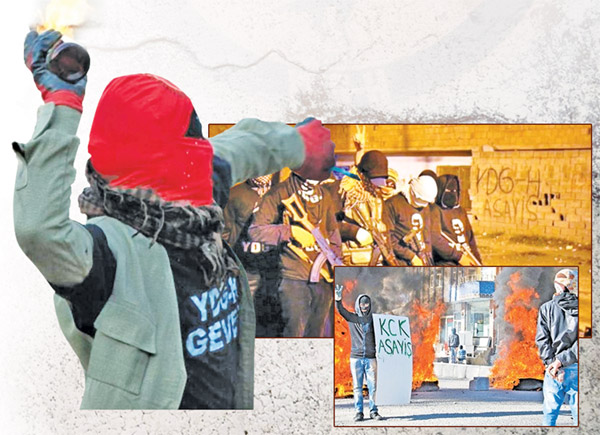 |
| "KCK Public Order" |
The KCK is in fact a political employment tool personally invented by Öcalan so that members of the PKK released from prison as of the mid-2000s would be able to remain in the organization, engage in politics and not feel marginalized or forgotten. The basic job of the KCK is to enable control to be taken over urban areas by moving away from the mountains towards the cities to achieve control there and to bestow a supposedly legal guise on the PKK’s illegal activities. What the PKK, which is regarded as a terrorist organization by most of the world, really intends this way is to interfere the political processes under a ‘legal’ guise by way of the KCK.
Under the Contract, Abdullah Öcalan is described as the founder of the KCK, who also appoints the head of the Executive Council and approves all decisions taken by that council: In other words, the KCK receives its orders and instructions from Abdullah Öcalan and the PKK leadership. Öcalan has long wanted to capture the citadel from the inside by the use of political action. Indeed, interviews with Öcalan show that KCK is the sole model he insists on.
The KCK came into being by descending on urban areas under a legal guise in order to make the presence of the PKK felt there in a particularly powerful manner. Through this organization, the PKK seeks to establish control over political figures, municipalities and mayors in the region and is known to be powerful enough to do so and capable of determining members of Parliament and mayors. The Strategic Thought Institute offers the following analysis:
The KCK is charged with maintaining control in the city and keeping legal politics in line with that of the PKK... So much so that when a mayor goes somewhere he will inevitably be accompanied by a member of the KCK. These are popularly known as “commissars.” It is impossible for mayors to oppose their views. 81
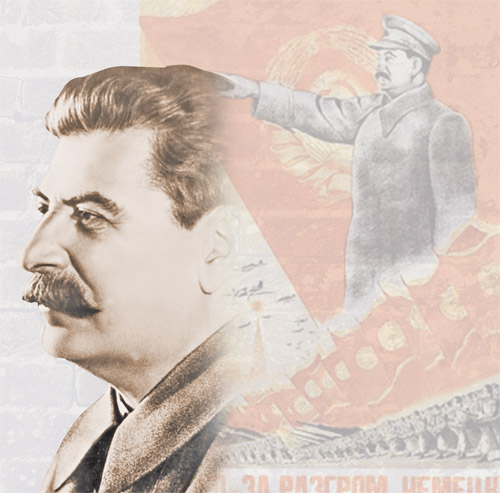 |
This organization is in fact an entity that is commonly seen in Stalinist systems. Stalin directly established various bodies, such as unions and the army and appointed figures known as “commissars” to these. These commissars were essentially all communist militants. Their job was to ensure that these organizations remained under control, to achieve hegemony over the cities, to identify any opposition and to arrange the system as they saw fit. The PKK is now regarded as having established political influence over the HDP by using this tactic. Indeed, the term “commissar” is described in Stalinist sources as the protecting the strong and imperishable domestic loyalty to Stalin by those structures that are wished to be kept under control. 82
In short, the KCK is an organization that seeks to bring about an entirely communist order to the region, beginning with the cities, predominantly through the use of legal political figures by oppression but that also employs illegal members behind the scenes in order to achieve the aims of an illegal entity. The KCK Contract clearly reveals that the organization is one that accepts members, that has its own executive and judicial bodies, that tries people, that stipulates the existence of its own armed groups and local and central authorities, that collects taxes and that seeks to establish authority over local administrations. In other words, it is a so-called state. 83
The journalist and author Sedat Laçiner’s provides a particularly important analysis:
The KCK was intended to direct acts of civil disobedience in the city, to involve the populace in activities, with cars being burned and the people fighting the police, as in France, and thus aligning the state against the local population. On that basis, the KCK was to act as a second state parallel to the Republic of Turkey and would strive to build up subjects of that state. The plan was to create a parallel authority in which KCK courts would take the place of state courts and KCK officers would take the places of the governors appointed by the state.
Violence still occupies pride of place in the KCK’s ways of working. What makes a movement a terror organization is the extent to which it resorts to violence or not. The key word is violence… If people think you are a terrorist movement and take part in various actions or close their shops ups because they are afraid of you, then this is an act of terror. If a KCK official in Diyarbakır holds a court, and people go that whether they want to or not, and if they receive a punishment at the end of the process, then this is an unlawful act of terror. A bomb going off is not all that makes a terrorist action. 84
This organization described as a political body is, in fact, one under the total control of the PKK, and even pressured by the PKK, as the journalist and author Adem Yavuz Arslan describes:
It appears that the people did not elect those heads of municipalities; The KCK put the names forward and it happened. They have no initiative. They are even tried and punished for not taking part in actions. A cleaning worker questioned and sentenced Osman Baydemir. 85
At this point, the fact that some legally constituted parties in Parliament also follow the instructions of and even act in line with pressure from the PKK is clearer than ever before. HDP MP Pervin Buldan’s answer to the question, “Do Kandil, İmralı and the party act as a single body?” is particularly worthy of note:
It will be useful to make it clear that you cannot distinguish the Kurdish Freedom Movement (referring to the PKK) from bodies engaging in politics in Turkey. Consequently, there are the relatives and children of people in the political mechanism involved in the freedom movement. 86
Adem Yavuz Arslan says this on the same subject:
Those sections concerning BDP (HDP) politicians are thought-provoking. Because the BDP members are literally the captives of the KCK… They have no initiative of their own. ... They determine everything, from how they should speak to what they do and where. 87
The analysis provided by the journalist and author Ahmet Altan are especially significant:
Read the KCK Contract.
It is the constitution of a dictatorship.
I was horrified by the articles I read.
It starts off with libertarian statements, but then refers to the “leadership” as the "only decision-making body."
I do not know what a Kurd who disagreed with the “leadership” is supposed to do. Such a possibility has clearly never even crossed the mind of the authors of this constitution.
From what I can tell, in their eyes no Kurd could ever think differently to the “leadership” on any issue.
The KCK Executive Council can bring in the Popular Liberation Court Prosecutor’s Office and appoint judges.
The “press committee” engages in “activity aimed at improving ideological and national unity.” Do Kurds really want to live under such a system?
Is the only way to escape years of oppression by the Turks to live in a society run by a leadership, councils and committee and in which a conception of national unity” is officialized?
If our BDP friends think that this KCK “constitution” is really very modern and beneficial, would they propose the same items for the new Turkish Constitution?
Should Turkey also have a “leadership,” an “executive council” and “committees?” Should the council be given the right to appoint prosecutors and judges?
If they do not desire such things for the Turkish Constitution, then why do they wish them for the Kurds?
Why is a constitution that the Turks would never accept and that nobody now could even think of proposing to them, be imposed on the Kurds by Kurds? 88
This constitution of the organization in question is being imposed on the Kurds by the PKK. The fact that the constitution of a communist dictatorship is being imposed on our beloved Kurds, who are part and parcel of us, shows the kind of plan in operation for the Southeast of Turkey first, and then the Middle East. In order to better grasp this, let us have a closer look at the KCK’s objectives.
1. The dictatorship system and the deification of its leaders
Dictators such as Lenin, Stalin, Mao and Kim Il- sung, who ran the system in communist regimes, engaged in mass social conditioning programs that almost resulted in them being all but deified. The term “cult of personality” nicely encapsulates this idea of “deification of the leader.”
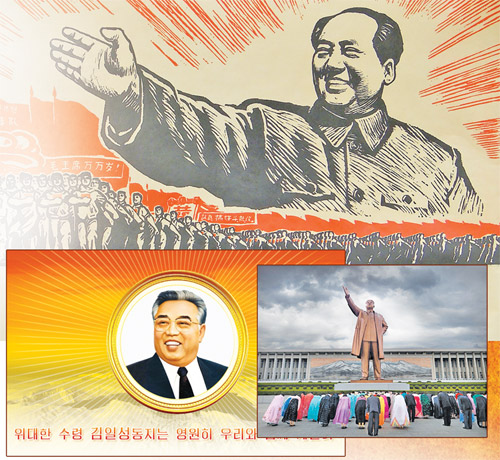 |
| Communist dictators are often idolized to facilitate the obedience of the masses. The leaders are depicted as shining suns or as giant statues. Masses leaning in front of the statue of Kim Il Sung indicate the effectiveness of such propaganda today (lower right). |
Communist dictators such as Lenin, Stalin, Mao and Kim Il- sung were deified in order to ensure the obedience of the masses. Sometimes the leader would be personified as a sun shining down on his people, while sometimes giant statues would be erected, and people would be made to prostrate themselves before them. All this was intended to portray the communist leader as a guide who could never go wrong and to encourage his being regarded as a so-called “divine entity” who would bestow happiness and joy on those who believed in him.
PKK leader Abdullah Öcalan also uses this tactic of deification, which began with Lenin, the leader of the Russian Revolution, the first communist revolution.
One can see the effect of this tendency in Item 11 of the KCK Contract under the heading “The Founder and Leader of Kurdistan Democratic Society Confederalism.” The contract literally, may God forbid, depicts the head of the terrorist organization as a divine entity, portrayed as the leader of the Kurdish people, one who knows and meets all the people’s needs. Supposedly, he is the final arbiter, and all those beneath him follow him. Opposition to this supposedly divine being, the leadership, is grounds for war, as set out in Item 33.
Abdullah Öcalan, the leader of the terror organization, describes himself in his book The Democratic Civilization Manifesto as a leader who thinks of and plans everything for the Kurdish community, who suffers for them and leads them to freedom and who strives to protect the rights and traditions of the Kurdish peoples in the Middle East against savagery in capitalist civilizations.
Öcalan’s efforts to give the impression of being a divine being in his book also attracted the attention of the prosecutor in what is known as the KCK Case. In the indictment he drew up, Istanbul Prosecutor Adnan Çimen described how Öcalan strove to portray himself as a mythological and genderless semi-deity:
Indeed, Öcalan even seeks to deify himself and bestow on himself the title of a mythological and genderless semi-deity by comparing “his departure from Urfa to the departure of the Prophet Abraham from the Hebrew people and his capture to the crucifixion of the Prophet Jesus.”
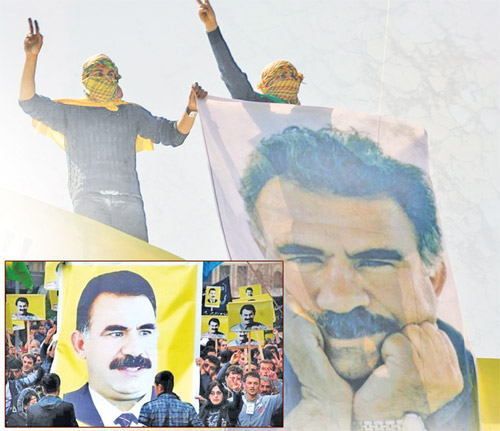 |
| Just like other communist dictators, Öcalan attempts to show himself as god (God is beyond that). He attempts to influence the masses in this way. |
Therefore, Öcalan, whom the contract seeks to embody as the leadership, acquires both a physical and a spiritual identity, and is heralded as the sole and universal representative of the Kurdish people, while efforts are made to maintain Kurdish society at the level of a specific reflex by way of Öcalan...
The way that the leader of the organization compares himself to the Prophet Abraham (pbuh) is also tragicomic. Because as the indictment states in various places, he holds the religious factor responsible for the backwardness of the Kurdish people and for other negative qualities. The effort of such a person to equate himself with concepts regarded as sacred at the popular level is simply misappropriation.
Selim Çürükkaya, one of the founders of the PKK who subsequently left the organization and relocated abroad, describes the disturbing psychology in Öcalan’s attitude as follows:
Öcalan, who describes himself as a great leader rather than just an ordinary one, tried to ensure that militants would remain eternally loyal to him by having them shout slogans such as “We are with you, heart and soul, o Chief!” every evening.”
One address that Öcalan gave to members of the organization is particularly significant in that context:
I am someone who regulates himself most wonderfully. I have made myself as knowledgeable, powerful and determined as a god until I attain the highest level of humanity although I started from the very lowest. 89
Indeed, technical surveillance of KCK members has shown that they regard Öcalan as a prophet. “Members of the KCK visiting the house where Öcalan was born, which they look at as a kind of ‘Kaaba’, said “We have walked around the Kaaba and become pilgrims. We have rubbed our faces in the dust.” 90
Something similar happened in the Sur district of Diyarbakır. The words “Greetings to the Prophet Apo. KCK” written on the walls of EŞİT-ÖZGÜR-YURTTAŞ (EQUAL-FREE-CITIZEN), an association known for its proximity to the BDP, in the district of İskenderpaşa provoked a strong reaction from local residents, and was later removed by citizens. 91
As we have seen, according to the concept of “the leadership” as spelled out in the KCK Contract, Öcalan will be regarded as divine (surely God is beyond that), and as a result of that, a communal system will be established under the control of a wide-ranging and bloody dictatorship. We can examine that communal system in the light of the descriptions provided in the KCK Contract as follows:
2. The primitive communal society envisaged by the KCK Contract
Karl Marx’s interpretation of history was based on Charles Darwin’s now scientifically discredited theory of evolution. Marx hypothesized the presence of a dialectical process from the primitive to the more advanced in living things and suggested that this also needed to be applied to history. According to this false view, centered around materialism, history begins with the first hominids. This mythical creature was neither fully human nor fully gorilla, but it gradually acquired human characteristics as it gained the ability to learn to use tools. This fantastical tale is still taught to our children in textbooks.
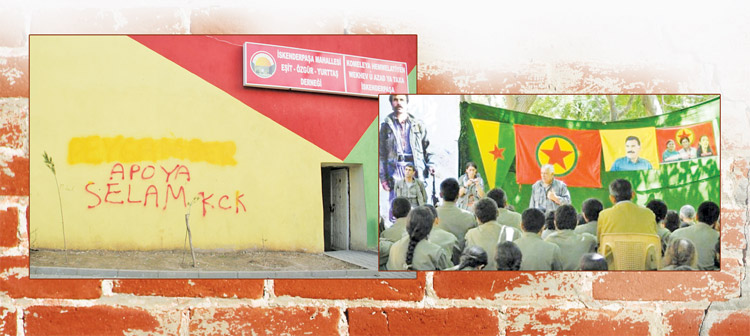 |
| The portrayal of Öcalan as a god or a prophet gained acceptance among some PKK terrorists (God is beyond that). Such a system idolized the leader as a god also facilitated obedience to the leader. The ones questioning the system have no right to live anyway. “Salute to Apo. KCK” |
At this point, it will be useful to remind ourselves of an important fact we have already touched on; in the same way that there is no scientific evidence for a change from the primitive to the more advanced in living things, so there is none for the course of history taking place within such a dialectic. There have therefore never been any “primitive” periods in which “primitive” entities were living. Ever since its creation, mankind has consisted of intelligent and civilized communities, so much so that there are traces of societies in the past that were more advanced and civilized than we are today. (For detailed information see, A Historical Lie, The Stone Age by Harun Yahya)
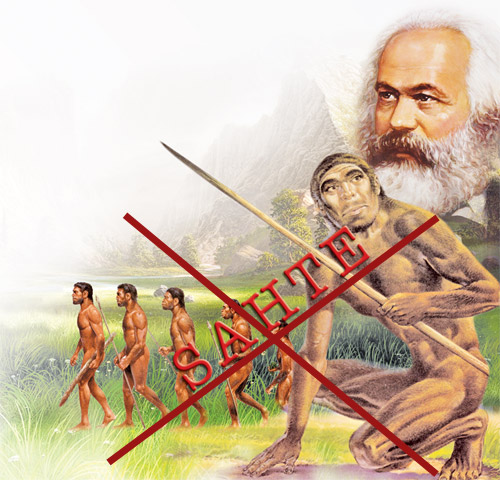 |
| Marx developed the idea of communism after being inspired by the fake theory of evolution and claimed that history developed through dialectics, assuming a dialectic development exists among the living beings. However, neither living beings nor history developed through dialectic. Evolution is a complete fallacy. |
According to the false conception of history that Marx based on the equally false theory of evolution, there were semi-naked ape-like men with spears in their hands and children wandering around at random. The women would gather fruit or prepare food. These people spent most of their time finding sources of food and shared everything with one another. They ate the animals they hunted together. They shared their weapons, their food and even their women.
Through this picture, materialists - and especially communists - seek to describe a model of society in which there was no greed or selfishness. Marxists maintain that there will be no social conflict in a society in which there are no anxieties over acquiring possessions or having a family. In fact, however, the society described is so degenerate that not only does it have no private property, but also no idea of morality or religion. Conflict will manifest itself in the form of slaughter in the streets, severe conflict and wars in such societies that have lost all values. Immorality and degeneracy will reach indescribably high levels.
Of course there is much to be criticized in savage capitalism, and we have looked at these issues and examined the harmful aspects of capitalist thinking in detail in various previous publications. However, this mythical communal system, fabricated in order to criticize the savage aspects of capitalism, describes an even more horrendous system by discounting everything that makes human beings human, such as faith, religion, sacred values, the family and morality. A climate in which there is no fear of God will soon turn into a battleground in which savagery, violence and psychopathic behavior run riot. Unpreventable degeneracy in which women and children are regarded as being owned in common will ensue, and no institutions or values will remain.
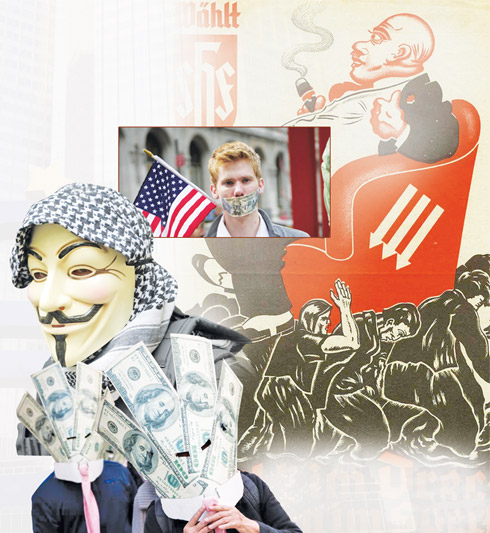 |
| Neo-liberal capitalism is certainly a materialistic system that brings with it disaster. However, its only solution is the Islamic morality based on the Qur'an, not communism with a more violent ideology. |
As a result of the claims of the theory of evolution being regarded as true, the individuals that constitute such a society will be treated as mere animals that have yet to complete their development, and violence will become a simple matter. It must not be forgotten that the greed-driven system produced by capitalism is not the only factor that drives people to selfishness and violence; the fundamental cause is the absence of fear of God. It is therefore utterly deceptive to paint a picture of happiness within this mythical communal way of living that is bereft of faith and moral values.
If we wish the tragedies caused by present-day capitalism to come to an end, and if we wish people to live as equals and enjoy freedom, love, human rights and democracy, the only way of achieving this is set out in the Qur’an. Only a social system based on the Qur’an, and not superstitions fabricated in the name of Islam, can enable all people to live in prosperity and justice.
To return to the communal system of which the PKK dreams, this fantasy, based on no scientific reality whatsoever, is set out in the initial part of the KCK Contract in the words “Based on the historical tradition of democratic and communal living of the Kurdish people…” and claims that Kurdish people once lived like that. In the view of both Marx and of his follower, Abdullah Öcalan, matters present in modern-day society, such as profit-making and the acquisition of property, religion and moral values are all regarded as a loss of values of communal society. The web site Serxwebun (Independence), one of the PKK’s publishing organizations, describes the importance of communal living in these terms:
The communal quality in the formation of a social existence is a question related to the essence, not to shape. It proves that society can only survive in a communal manner. Losing the communal quality is identical to not being a society any longer. Any development against communal values means also the loss of certain values of the society. That being the case, it is realistic to regard communal life as the fundamental life-style. The human being species cannot maintain its existence without this life-style. 92
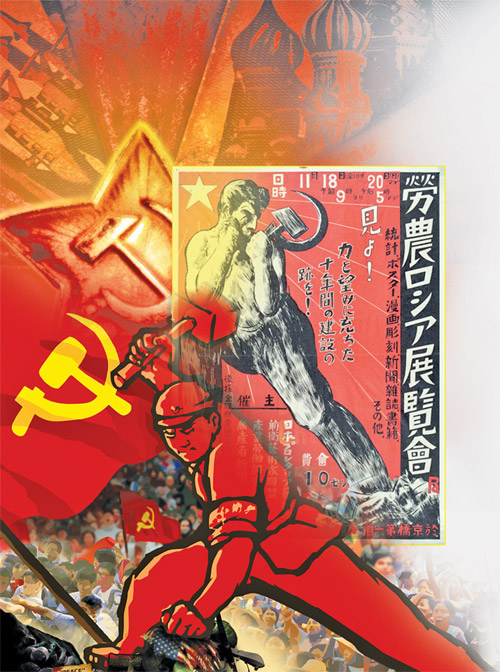 |
| In a communal society, which is a prerequisite for the communist system, all the members of society other than the leaders are considered as "sheep to herd". |
By means of the expression in the quotation, stated as “any development against communal values,” the moral values such as religion and good morality are intended. In such a system founded on no moral values, it is impossible for concepts like mercy, compassion or love to prevail. For that reason, due to this distorted belief system, man is considered to be a worthless being. As a result of that mindset, for example, a senior member of the PKK is easily able to order the terrorists under his command to shoot their injured colleagues in the head (this will be described in detail under the heading “Internal executions in the PKK”). According to them, children being injured during demonstrations or women being killed are unimportant. In these people’s opinion, even if they are Kurds women and children are of no more value than sheep, and there is therefore nothing wrong with sacrificing them.
The need for a return to communal living and the importance of this to the organization is set out as follows in the introduction to the KCK Contract:
The recreation of a communal democracy with modern values means again making socialism once again the rising star.
As we have seen, the ultimate aim is to build a communist order, for which reason a communal society must be established within the present-day order.
The problem is that the communal lifestyle desired by the PKK is the exact opposite of the lifestyle of our Kurdish brothers in Southeast Anatolia. There is no religion in communal life, and the Kurdish people cannot live without their faith. There is no such concept as the family in communal life, yet family and tribal values are of prime importance to our Kurdish brothers. Communal living allows its members to engage in sexual relations with whomever they wish; mother, sister or other female individual. Such an institution would quickly become a nightmare for our Kurdish brothers.
The web site Haber.sol.org.tr says that commune members “Maintain their physical and social existence by freely loving and mating within a communal lifestyle…” 93
3. Imposition, not freedom: KCK citizenship
One of the most important aspects of the KCK Contract is that it completely rejects the Republic of Turkey and instead, imposes on people a so-called “KCK citizenship.” For instance, in the fifth article, it is said that, “Everyone having born and living in Kurdistan, or faithful to KCK system, is a citizen.” It is clear that the phrase “Kurdistan” here is being used for our country’s Southeastern region in a brazen manner. According to the contract, everyone who was born and lives in Southeastern Anatolia has to accept the contract and therefore, is a citizen of not the Republic of Turkey, but of the KCK. Let alone violating the contract, even having differing thoughts is considered a crime. Violation of the contract will be considered “treachery and submission” and will be punished. Punishment will be carried out by the “people’s courts,” which is a part of the judicial power as defined in articles 27-30.
This practice was applied even to influential politicians in the region and was indeed put into practice. For instance, the KCK, via two cleaning personnel of the Municipality, tried Osman Baydemir, the former mayor of Diyarbakır, for refusing to participate in a signature-gathering campaign called “Öcalan is my will”. 94
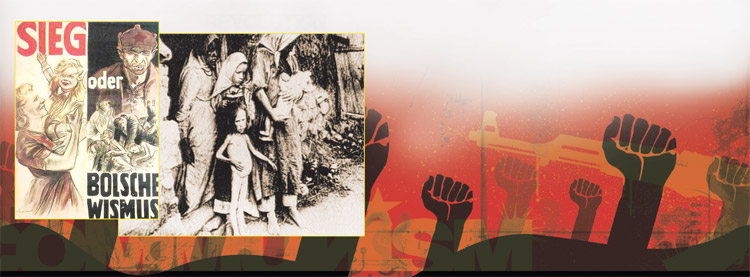 |
| There is no concept of family in the communal life. Such a system that abandons the notion of religion, morality, state and family is the main source of the violence and degeneration. |
Journalist-writer Murat Yetkin recalls an odd incident where a person who was tried and found guilty by KCK courts begged for an attorney:
The thing that surprised us the most was the fact this person thought it was normal for the PKK to set up kangaroo courts within the borders of the Republic of Turkey, that acted like alternatives to legal courts, and actually considered its verdicts legal.
It is clear that this empire of fear built by the PKK in Southeastern Anatolia is building a significant threat towards our people and forces them to answer to these kangaroo courts. Yetkin makes a very good point about the matter in the same piece:
These are “state-within-state” structures, which are called “dual powers” in Leninist theory, and which we can call “parallel state”; this was also the basis of the “canton” organization in Kobane (Ayn al-Arab). And it is not only the courts… In the rural parts of Diyarbakır and Şırnak, the PKK has set up not only its own “martyrs’ cemeteries”, but also its own police force, prison and even “recruitment points” which they use to take people to mountains. 95
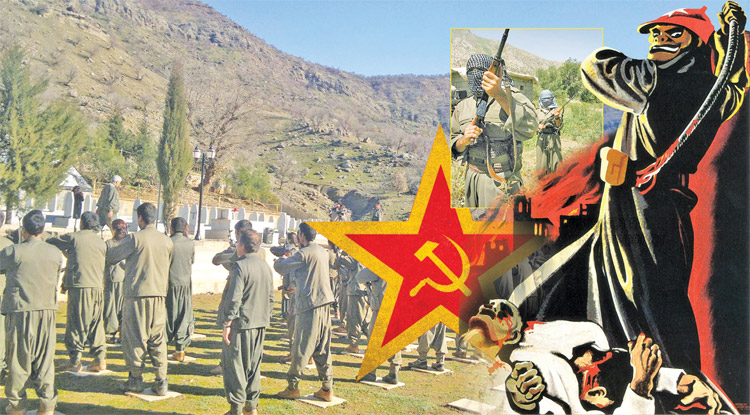 |
| The KCK aims to seize the Southeastern Turkey through insidious methods and to establish an empire of fear with a communist, Marxist-Leninist philosophy. It realized most of its goals during the so-called ceasefire period called the Solution Process. |
In addition to all this, the people who are called “KCK citizens” are obliged to follow articles 31-33 of the contract, which gives KCK citizens “the duty of necessary defense”: “Everyone is obliged to be prepared for necessary defense and support necessary defense efforts… If all peaceful efforts fail, guerilla wars based on self-defense and riots will be the course of action…” In other words, people are first forced to be KCK citizens and then compelled to participate in the guerilla wars of the PKK, all under the pretense of necessary defense.
4. Efforts to legitimize terror
In the Articles 4 and 9/a of the KCK Contract, it is claimed that “Kurdistan is subjected to an imperialist colonial system.” With this phrase, they are referring to Southeastern Anatolia and the Republic of Turkey. The phrase “Kurdistan” in this statement is a false name only used for the divisive endeavors of the PKK. Our country is beyond these outrageous remarks.
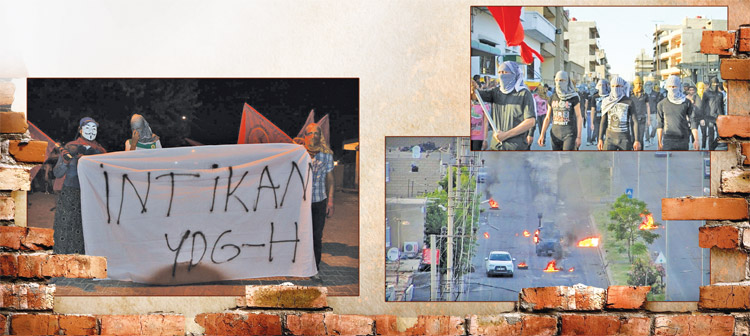 |
| Due to its dominance over the region, the PKK is sustaining its terrorism in our streets. Below: The streets of Cizre set on fire by the PKK. "REVENGE. YDG-H" |
It is clear that there is an attempt to legalize the terror attacks by the PKK and the KCK through article 32 entitled “Duty of Necessary Defense,” under the pretense of “anti-imperialism.” Furthermore, with use of terms like “long-term public war strategy,” “counter-revolution,” “revolutionary force” and “national independence war,” the terrorist organization clearly focuses on violence as its primary method, and works to present “terrorism” as a justified method of struggle.
Let us remember one important fact: The foundation manifesto of the PKK and its activities have always aimed to destroy the Republic of Turkey, which is described as a “colonial power” in the manifesto. Therefore the real aim of the KCK Constitution is forcing the so-called “KCK citizens,” that is the Kurdish people that were made citizens of this state founded in Southeastern Anatolia against their will, to participate in terrorist acts under the pretense of “necessary defense.”
5. Founding a new system of state by destroying the current one
In the preamble of the KCK Contract, it is said that, “Kurdistan Democratic Confederalism is not a state system, but the non-state democratic system of the people.” The contract harshly and frequently criticizes the concept of the state and portrays it as the reason for all the evil in the world. The biggest reason behind this is certainly the fact that communism is completely against the concept of the state.
Even though in the preamble of the contract there is an attempt to provide a different description for the KCK, various provisions include definitions of structures such as “citizenship,” “tax collection,” “warfare due to necessary defense,” “duty for active participation,” “legislative power,” “executive council” and “judiciary system.” These phrases all describe a full-fledged state system and apparatus.
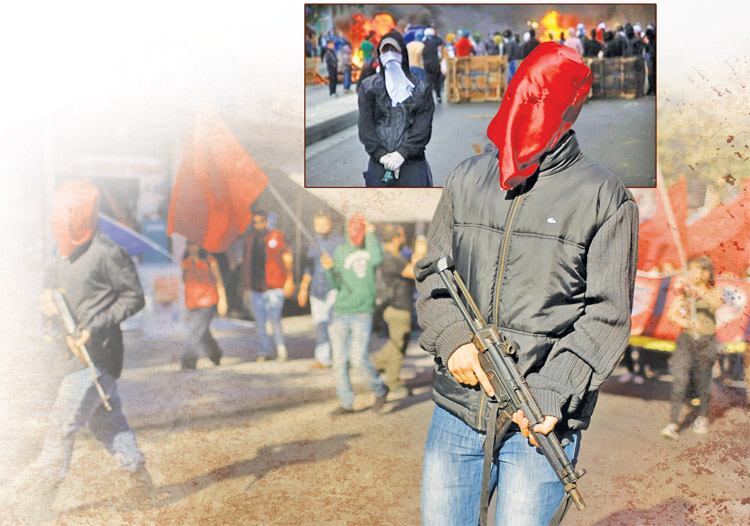 |
| Due to their dominance over the region, masked militants of the YDG-H can freely move around Turkish streets with their weapons. |
Indeed, in one of his books, Abdullah Öcalan, the leader of the terrorist organization, writes the following words: “…it is clear that we cannot overcome the problems only by working to destroy the state. In fact, in the Soviet experience, when the communists overthrew Czarism and built their own regime of dictatorship, the results proved to be utterly lesson-worthy.” 96 Clearly, Öcalan and the KCK structure that he runs aim to completely destroy the state and replace it with a new state based on the communist ideology.
The ultimate goal with the use of the KCK
If you ask certain groups in Turkey and around the world “what the PKK ultimately wants to achieve,” they will probably mention the recognition of Kurdish identity, recognition of the mother tongue or some manner of autonomy. However, none of these things represents the real goal of the terrorist organization because the terrorist organization was built, not for the Kurdish people, but for the purpose of spreading communism throughout the Middle East, and even around the world. To this end, they try to use Kurdish nationalism, Kurdish language and the years-long persecution of our Kurdish brothers and sisters as a means towards that end.
The KCK Constitution was drawn up to put this desired communist system into practice. According to this plan, a dictator will lead this system that will replace the existing legal state and people will be made slaves, in line with KCK rules that determine the conditions of a communal system. As this is happening, people will not be allowed to disobey this so-called KCK state’s instructions, and they will be punished immediately if they do, while terror will be practiced as a state rule. The introduction of a communist system would not be limited to these regions and the said communist state regime will be exported first to the Middle East and then to the rest of the world.
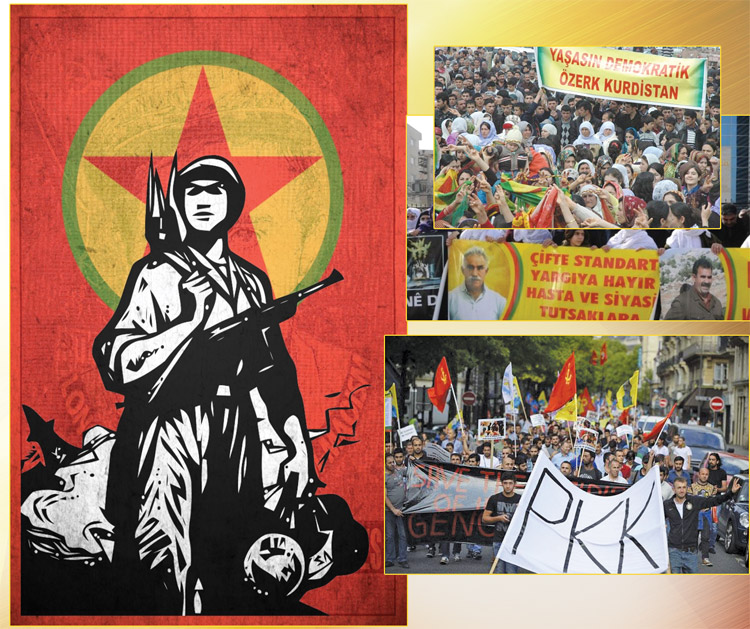 |
| The PKK has always abused Kurdish nationalism and tried to deceive some Kurdish people into supporting them this way. However, the Kurdish nation represents chivalry whereas the PKK represents treachery. “Long live democratic Autonomous Kurdistan.” |
In truth, Öcalan, who has recently abandoned his communist rhetoric as a tactic, spells out this plan setting a different tone:
The KCK Contract is the first stage of the struggle for the expansion of radical democracy which is based upon peoples’ democratic organizations and decision-making power first in Kurdistan, and then in the Middle East, followed by the entire world, by creating a new mechanism of social relations which transcends the statist mentality. 97
What he actually means with “radical democracy” is the communist order that the PKK has been longing for for 40 years. The word “democracy” is used only to mask their true intentions and their true purpose has nothing to do with democratic norms or governance.
It is of paramount importance that our state and administrators take the following into consideration: The PKK will not stop when Kurdish people are granted the right to education in their mother tongue, or an autonomous region in Southeastern Anatolia or even if a federal state in the region was established. Due to the ideology of the PKK, it is impossible for it to stop its activities in the region and recognize and submit to the authority of the Republic of Turkey. If the PKK manages – God forbid – to break Southeastern Anatolia away from Turkey and successfully build a communist state there, it will not stop and will instead continue its terrorist attacks to make the rest of Turkey a communist state as well. From that point on, it will continue to lay the foundations of a communist world state, progressing through the Middle East in the south, the Balkans and Europe in the west and the Caucasus in the northeast. Once it manages to build a basis, it would not be difficult for it to find supporters.
The scale of the KCK's set-up
The situation is grim. Southeastern Anatolia can almost be considered under the rule of a state mechanism built by a communist terrorist organization. The PKK has now penetrated our borders and reached even the city centers. In some regions of Southeastern Anatolia, KCK courts are considered legal entities and it is quite ordinary to hang Öcalan posters in state buildings and people are tried in street tents that have Öcalan posters displayed on them. The PKK has set up its own military, carries out military activities in full view, performs drills, blocks roads, bullies people, martyrs our soldiers, police officers and citizens in the urban areas through stealthy ambushes. Some municipalities held by the HDP and under the threat of KCK, which derives power from the attacks of the PKK, take the liberty to announce publicly that “they have declared self-government.” It needs to be remembered that this is also through the pressure of the PKK.
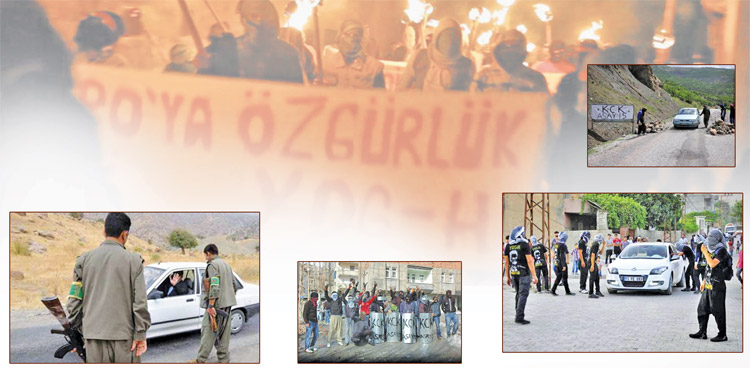 |
| YDG-H militants blocking the roads in Turkish cities. This recklessness gained strength during the so-called ceasefire, and now the PKK has now come to the point of laying treacherous traps within the cities. “Freedom to Apo” |
Orhan Miroğlu, an AK Party MP, wrote in his article of May 17, 2015, when “the Solution Process” was still on the agenda, “Writing from the Mardin ‘Canton’,” that 150 people, mostly children, were taken to mountains in the past month in Kızıltepe and Dargeçit. 98 Şanlıurfa Governor İzzettin Küçük announced on TV that 3,000 children were abducted in the first six months of 2015 in the region. In Suruç alone, 400 children were taken. Küçük expressed the gravity of the situation, saying, “We were informed that the PKK wants to take one kid to the mountains from every house.
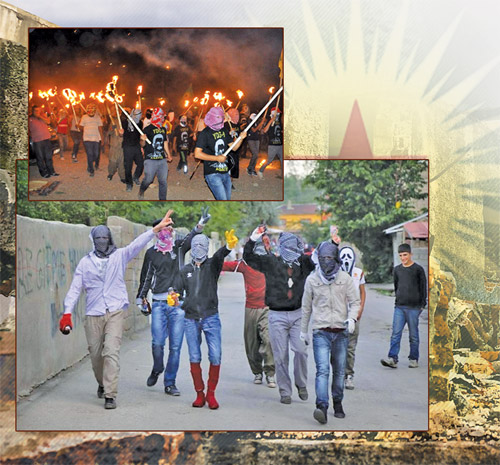 |
| The PKK militants are on the streets now. Southeastern people have been living under the pressure of the PKK terrorists for a long time. |
Also many district officers (muhktars) in Şanlıurfa were abducted to Kobane. We informed the authorities of this situation.” 99 Regrettably, these are only the known cases. The families in the region continue to struggle with this problem, and many barely escape abduction of their children, while others find it best to hide their children or use everything they have, despite their poor financial standing, to send their children to distant cities. The PKK has gained a foothold in the cities and not only does it martyr our police, soldiers and citizens but also takes our children to the mountains, and surprisingly, this seemingly cannot be prevented.
Miroğlu narrates his experiences in Dargeçit, Mardin, during his election campaign as a candidate of the AK Party:
We recently paid a visit to our regional office and only 20 people came to welcome us. Fear can get the best of people. The AK Party will get its share of votes from this town but people whose houses are under attack with bombs and gunfire almost everyday are under so much pressure that they are not able even to say hello in broad daylight to their representatives whom they will vote for and send to the parliament.
I don't know about my colleagues, but for one moment, I felt like I had passed the border of South Korea and entered North Korea for my election campaign. I have so many friends in this town. If it wasn't for this nightmare hovering over the town, I have no doubt that they would welcome us as early as the entrance of the town... 100
The terrible consequences of this reign of fear became visible following the June 7, 2015 general elections; eastern Turkey up to Northeastern Anatolia was delivered into the hands of the KCK. This horrible structure that has taken almost entire control of Southeastern Anatolia is now spreading towards the west, to big cities and even the biggest universities in Turkey. Patriotic students in Istanbul, Izmir and other western cities are martyred by the PKK in full view, and terrorist organization’s banners are carried with impunity at ODTÜ, Istanbul and Ankara Universities.
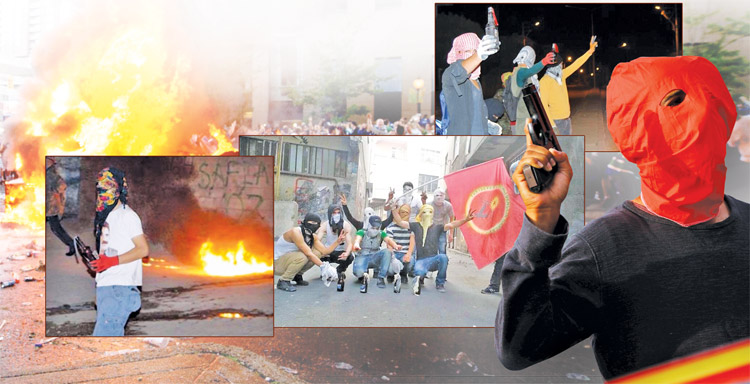 |
| YDG-H militants admitted that they became better organized and armed in the ceasefire period during so-called Solution Process. |
It is a known fact that as the so-called Solution Process was going on, particularly in Southeastern Anatolia, the members of the terrorist organization accumulated significant wealth in numerous economic fields, particularly in construction, health-care, textile, agriculture and the entertainment industries, and that they have monopolized these industries. This is explained as follows in the Special Diyarbakır Report of the 21st Century Turkey Institute:
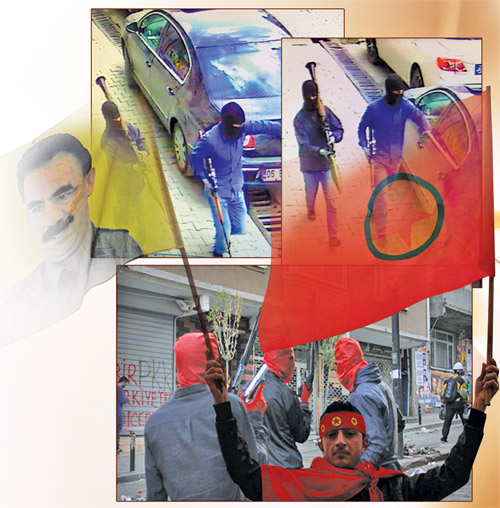 |
| The PKK terrorists walking fearlessly on the streets with their rocket launchers became more determined to establish an empire of fear and to show that they seized streets of Turkey. |
It is safe to say that armed activities of the PKK, lobbying by the KCK, illicit money originating from drug trafficking under control of the organization and the fact that municipalities use law as a weapon have all played a determining role in this rise. 101
Economic power has also been achieved through pressure. Business people who are determined not to give in to the pressure of the terrorist organization have to live with a constant threat to their lives and risk their business. This is the main reason behind the frequent news of the martyrdom or abduction of workers at dam construction sites, the burning of construction machines, raided construction sites, abductions and roadblocks.
During this time, the PKK, under the supervision of the KCK, has set ablaze hundreds of schools, private teaching institutions and dormitories. Hundreds of village guards were martyred or made veterans; district officers, soldiers, doctors and teachers were abducted and the construction of dams and fortified outposts was prevented. It is a known fact through intelligence that the PKK has distributed weapons to almost every home in Hakkari, Beytüşşebap, Cizre, Siirt, İdil, Bingöl and Bitlis. Instead of the Turkish flag, rags of the PKK can be seen now everywhere in the region. The group gave 20,000 Kalashnikovs to its militia (YDG-H) and gave Glock pistols to YDG-H team commanders. According to the reports of security units on the group’s acts perpetrated in the period between late 2014 and early 2015 – in other words in the five-month-period when the so-called Solution Process was continuing – the PKK carried out 1,190 social events in these five months. As is well known, the PKK, which is expected by certain circles to lay down arms, resumed its malicious acts immediately after the general elections, ambushing both Turkish police and soldiers.
After the fighting has started, a confession came from the YDG-H: “We knew that the state would drop the peace talks, so we grew and organized ourselves meanwhile.” Members of the YDG-H who interviewed the Wall Street Journal made this grave statement: “There are many of us, and we are in every city in Turkey now”. 102
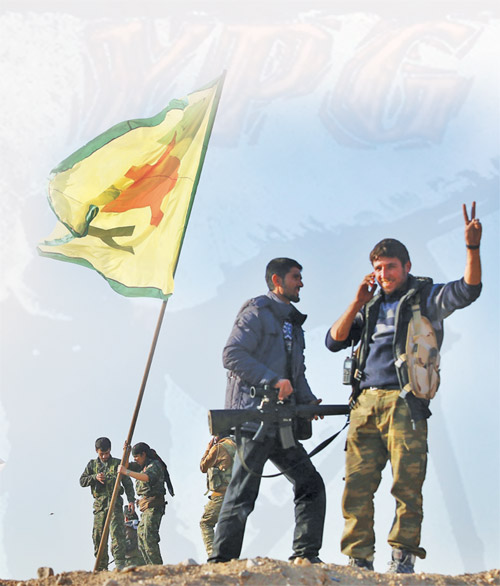 |
Hüseyin Çelik, the Chief Advisor to the AK Party Chairman, made the following explanation on December 13, 2013, revealing the gravity of the situation: “It wasn't the BDP who won the elections in 2009, it was the PKK and the KCK. But they didn't win it through democratic means. They did it by threats. The [terrorist] organization has worked on that election very hard. And this is how they did it: They prevented AK Party voters, and even party members, and ballot box officers, and building officers to go to the ballot box and cast their votes by force, by force of arms and threats. Our members, officers were directly threatened by phone calls from Qandil. They intimidated 45,000 Van residents, AK Party voters and prevented them from voting by threatening them. They set the car of one of our members on fire because he wouldn't listen to them. This is the reason why we lost in Van. It is the KCK.” 103
This fake, communist state-like organization is under the control of a terrorist group that is in the habit of backstabbing and staging cowardly attacks and therefore, it is not surprising that it manages its control through the spreading of fear and terror. The people of Southeastern Anatolia are living under severe pressure and threat while the mainstream media is largely indifferent to these realities, and for the sake of the Solution Process, chooses to feature people and statements that propagandize Öcalan and the PKK. Those columnists who go to Qandil and glorify (and sometimes hail) the terrorists, portraying their lifestyles like a fairy tale, are shown under favorable light.
The fact that the PKK will not lay down its arms, but will actually grow stronger and arm itself even more, that it will set up caches in the cities, cunningly establish hegemony over cities and then return to the fray as the communist ideology demands and once more turn its guns on our people in a cowardly manner is something we have reiterated and warned against throughout the ceasefire process. We issued that warning because it is obvious that due to its ideology, the PKK will never abide by a ceasefire or accept any such thing as peace, but will continue to use violence to achieve its aim of a communist state until the Turkish state collapses. If - God forbid - they manage to tear off parts of Turkey and build a communist state there then a massive surge in terror will result, which will ultimately plunge the entire world into turmoil.The PKK never abandoned its weapons and never will!
Armaments are the only source of power of Stalinism. Stalin managed to control the masses through armaments. Communism dominated Soviet Russia, China and Cambodia by force. Stalinism is nothing without weapons.
The PKK is a Marxist, Leninist, Stalinist terrorist organization. Armaments are the basis of its existence and its current power is manifested through the use of weapons. It also managed to influence Western society through armaments; the PKK, as a Leninist-Stalinist party, owes its all achievements so far to the use of arms. It knows perfectly well that without arms it will disappear and will not be able to impose its authority on any level. Therefore, THE PKK WILL NEVER LAY DOWN ITS WEAPONS!
When Öcalan called on the PKK to convene an extraordinary congress for abandoning its weapons, as a part of the process that came to be known as the solution process, it was received with jubilation by some circles both inside and outside Turkey. However, everyone has seen by now that things weren’t as they seemed. The PKK, not even once, kept its promise of laying down its weapons throughout its history and it will not do so in the future, either.
The PKK declared its first unilateral ceasefire on March 20, 1993 and extended it for another two months after the initial deadline expired. However, it never conformed to it. In 1993, during this so-called ceasefire period, 715 officials and 1,479 civilians lost their lives in terror attacks by the PKK.
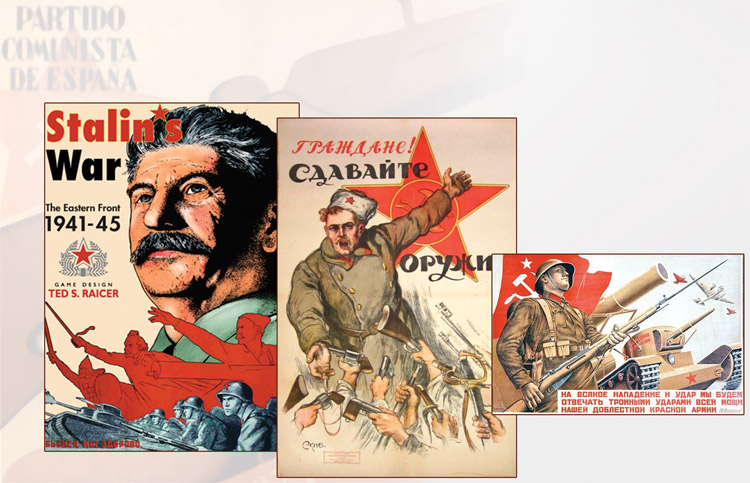 |
| The PKK has never given up - and will never give up - its guns unless its ideology collapses. In history, communist dictators have always acquired their dominance by force. The only reason the PKK was able to come to the urban areas and find European interlocutors was its weapons. |
The PKK once again declared a ceasefire on September 1, 1998 on the occasion of World Peace Day, during which the PKK martyred some 500 people.
On September 1, 1999, Öcalan in İmralı urged the PKK to drop its weapons but the PKK resumed its armed actions in June 2004 on the grounds that “their demands were not met,” because it had never actually laid down its weapons.
During the so-called “no-weapons period” between 1999 and 2004, the number of martyrs according to official reports was 604.
On October 1, 2006, the terrorist organization PKK declared a ceasefire for the fifth time, and terminated it once again on the grounds that Turkish military operations against it were continuing.
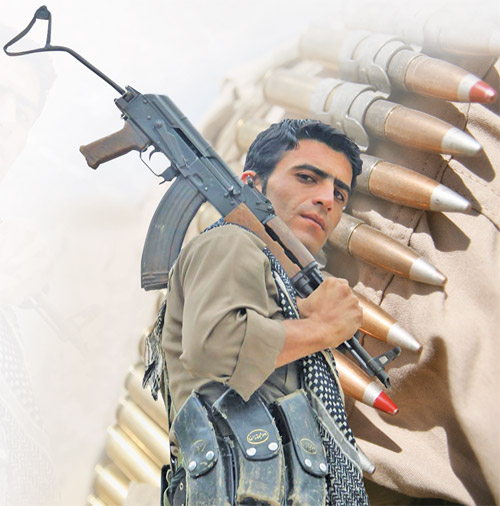 |
The KCK declared on April 13, 2009 that it had reached a decision on a ceasefire on the grounds of “necessary defense,” nevertheless, it staged countless attacks since then and martyred 134 people during this so-called ceasefire period.
Leaders of the PKK and the KCK have reiterated over and over again that the PKK would never lay down its weapons. HDP members also weighed in on the subject.
For instance, the KCK’s Qandil chief Sabri Ok said: “...Such disarmament is impossible as long as the reason for our very emergence exists right here and it is against our reality… Our movement definitely does not have in its agenda disarmament or withdrawal of our armed forces to certain places… Even discussing disarmament under these circumstances is disrespectful towards the will of the Kurds… Such things cannot be discussed until the leader Öcalan is freed and meets with the guerilla in person. And the guerilla will never abandon their weapons…” 104
Duran Kalkan, a member of the KCK’s Executive Committee, said: “We don't find the calls to the guerilla for disarmament meaningful or serious. We don't even want to discuss it. Guerilla will never lay down its weapons. … Only if there is a general amnesty that covers the freedom of Öcalan as well, then the PKK might consider, not laying down its weapons, but a ceasefire, but never laying down the weapons. Guerilla will never lay down its weapons.”
Leyla Zana also made it clear that disarmament is impossible when she said: “Armed conflict has now reached a certain point. I never discuss disarmament. That’s the insurance of the Kurds. As long as this problem persists, those weapons are the insurance of the Kurds.”
Cemil Bayık, the head of the KCK’s Executive Committee explains: “Laying down arms means surrendering. It means death. No one can ask us to do that. Let alone disarmament, even retreating cannot be considered.”
In an interview he gave to IMC TV, terrorist leader Cemil Bayık said: “The PKK will not leave its weapons until Öcalan comes and attends our congress,” and thus made it clear that the PKK will never lay down its weapons.
One of the PKK's administrators, Murat Karayılan, explained the condition for the PKK’s disarmament and said: “So long as Öcalan is in prison, even if he gives us the order to lay down our weapons, a guerilla will not do that.”
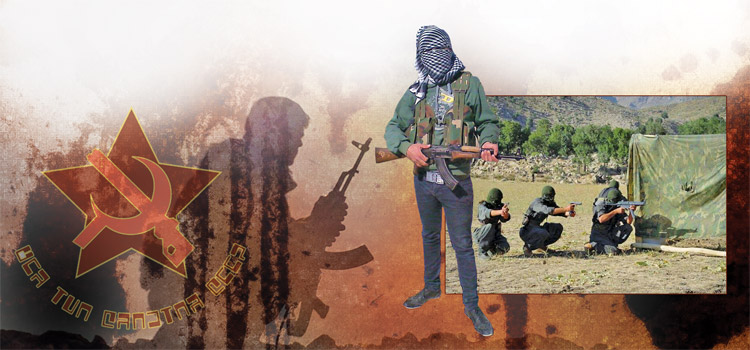 |
As can be seen clearly, PKK leaders have admitted openly, even during the so-called ceasefire period under the name of the Solution Process, that it was impossible for the PKK to abandon its weapons. As a matter of fact, in this period, the PKK blamed the existence of threat risks such as ISIL in Syria and Iraq for its failure to fulfill its commitment to disarm. In the meantime, it used the attacks against regions such as Kobane as a pretense and kept on asking the Western world to send it armaments. The Western world obliged and the PKK got ahold of more ammunition and arms beyond the Turkish borders that it can use against the Turkish soldiers; now it’s directing these weapons against Turkish soldiers. What really went on was replacing their outdated guns with more advanced, high-tech ones. Therefore, the PKK’s disarmament narrative has once again shown itself to be mere window dressing and it proved this at the earliest opportunity.
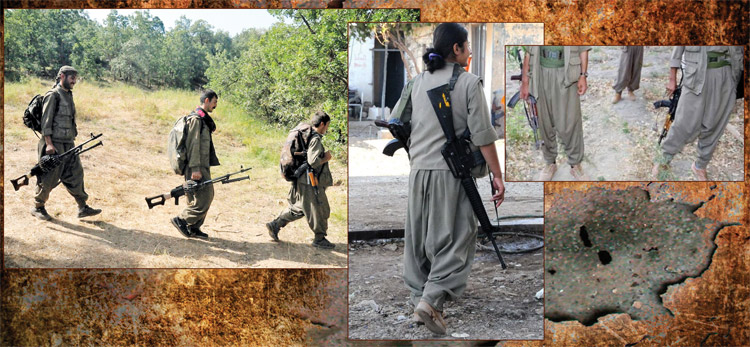 |
| The PKK becomes stronger and better armed following every ceasefire period. For the PKK, the rhetoric of laying down arms means replacing the old weapons with new ones. It is impossible for communist terrorism, which is based on violence, to lay down arms whatsoever. |
An account by Şemdin Sakık, a former founding member of the PKK, in which he quoted “Ceasefire is a tactic of war, not peace,” referring to Mao’s statementis very significant:
Ceasefire is a tactic in war. Throughout history, parties have to resort to the tactic of ceasefire at certain intervals in all wars, big or small, regular or irregular, open or covert, due to innumerable factors. Because this tactic is a break that one or both of the parties need. Sakık continues:
The organization, evry time it declared a ceasefire, announced to the people that it had done it for peace, for the solution of problems through dialogue. But practical reality progressed in the exact opposite direction. After every ceasefire, training, armament, relocation and deployment of armed militants, and their certain activities and planning have been intensified. In other words, every ceasefire was used for not peace, but for obtaining a fiercer, more destructive and larger scaled firepower. You can see this in the fact that after every ceasefire, the clashes were fiercer, the attacks were larger in scale. 105
In fact, Sakık cites the retreat after the 1980 military coup as a most significant example:
When we could no longer take the operations of the military coup of September 12, 1980, we either buried our weapons or sold them and went to Syria en route to Lebanon in small groups. This retreat continued until there was not a single militant left on Turkish soil and it was done without weapons.
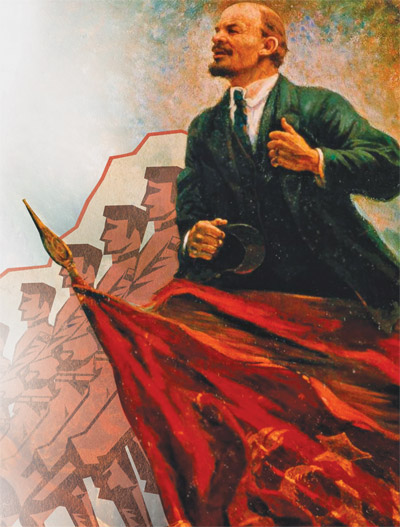 |
| Unless a scientific study is conducted on the Marxist-Leninist ideology of a terrorist organization, expecting that terrorist organization to lay down its arms is preposterous. |
As soon as we got where we wanted, we armed ourselves with Kalashnikovs instead of the guns we left in Turkey. Because Lebanon was an arsenal in the truest sense of the word; everywhere was full of state-of-the-art weapons. It wasn't difficult at all to find weapons, lots of weapons. It was as easy as buying bread and cheese from a grocery store.
We got as much weaponry as we wanted in Lebanon, to which we escaped after September 12 operations, got the necessary military and political training and for the first time, we started to apply all the rules of military organization to our lives. We recovered in the Palestinian camps in which we stayed for around two years and then returned to Turkey in packs.
Thanks to these military and organizational preparations that we had conducted by retreating to another country, we were able to carry out the August 15 attacks. Burying old weapons took us to more powerful weapons, while abandoning the field of armed conflict for a while took us to a stronger war. 106
It is important to pay close attention to this significant admission. The appearance of a retreating terrorist group that abandons its weapons has always been a delusion throughout history. As Sakık confesses, these withdrawals have always served the purpose of ensuring that the organization recovers, rests and gets more training while their old weapons were abandoned and replaced with newer and more powerful weapons. The Republic of Turkey always faced more vicious attacks after such retreats; that is what is happening again today. The reason for this is clear: The method that would indeed completely destroy the PKK is never tried, no scientific efforts are made against the Leninist ideology and people are driven to lethargy with “disarmament” rhetoric. The PKK has always taken advantage of this lethargy and is currently doing so.
In fact, Sakık describes the withdrawal and disarmament statements of the group, which have been quite frequently made over the last two years, with the following words:
The organization hasn’t retreated abroad, it just sent away some of the burden just like it always does. By serving the images of groups leaving the country to the media, it aimed to create an impression of ”retreat”. So in terms of the militants, it is most correct to say that ”they neither entered nor left Turkey this year”. 107
Communists have always used terrorism to bully the masses into submission and to abolish state organizations. Since they are never going to give up on terrorism, they will not give up on weapons, either. For this reason, those who built a fake peace scenario in their minds hoping that the PKK would surrender its weapons waited in vain. As long as there is no action to fix the twisted mind of a murderer, it is not important whether or not the gun is in his hand. He will always find a way to get to the gun. Focusing on destroying the gun alone without doing anything about the mindset of the murderer is nothing but deluding oneself.
Internal executions in the PKK
The PKK uses its armaments as a force against its own people as well. It must be kept in mind that today many people are forced to support the PKK due to intense fear and this fear results from the use of weapons alone. This policy of intimidation by the use of arms within the PKK is pursued quite viciously and an empire of fear reigns in the organization with horrible executions. People who are reported to be suspicious are executed by a firing squad in front of other terrorists upon the order of the “leadership,” or shot in the company of their family members, or buried first and then shot at the head, and sometimes horribly executed by being drowned in acid. The number of such executions, which can be for various reasons like spying, disobedience or failure to abide by the rules, is higher than any other terrorist organization. Prominent Kurdish politicians like İbrahim Güçlü and Kemal Burkay report that 15,000 to 17,000 Kurdish people have so far been killed as a part of internal PKK executions. Burkay elaborates:
The PKK implemented unprecedented terror to hush opposition within; arrested people and tortured them and shot them by firing squads. It turned its bases in Bekaa and South Kurdistan into killing fields. Also, it executed scores of defectors or dissidents. This meant that hundreds and thousands of young people who left their villages and schools for the freedom of the Kurdish people and with strong nationalistic ideas were massacred arbitrarily by this brutal cycle of the PKK. 108
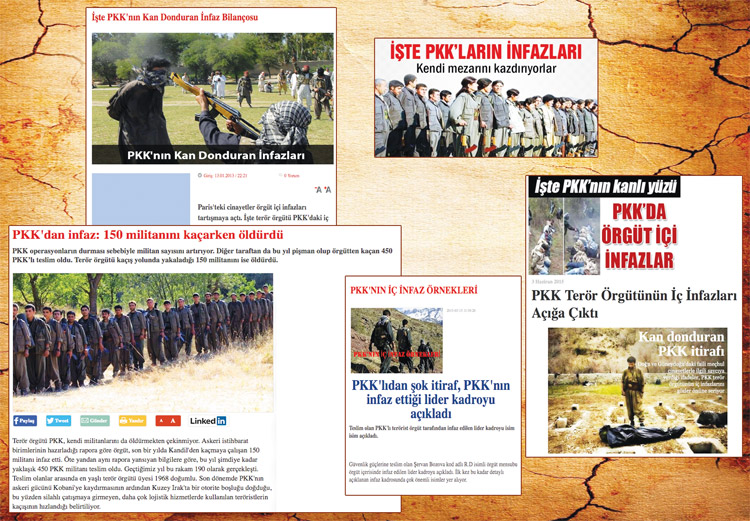 |
| INSTANCES OF PKK'S INTERNAL EXECUTIONS Shocking confession from a PKK terrorist, he disclosed the leader staff who were executed by the PKK HERE IS THE BLOODY FACE OF THE PKK INTERNAL EXECUTIONS IN THE PKK The internal executions of the PKK were revealed PKK’s confession to curdle the blood HERE ARE THE EXECUTIONS OF THE PKK MEMBERS They dig their own graves PKK MASSACRE: KILLED 150 OF ITS MILITANTS WHO WERE ABOUT TO FLEE HERE IS THE GRUESOME LIST OF PKK’S EXECUTIONS PKK’S HORRENDOUS EXECUTIONS |
According to information submitted by İbrahim Güçlü to the Human Rights Investigation Commission of the Turkish Parliament, a part of that 17,000 Kurds executed by the PKK are those members that the PKK and Öcalan considered rivals. In his statement under the heading “Executions against Kurdish groups and internal executions,” Güçlü reported that Öcalan said, “Let’s kill them and be the authority” with regards to these executions.
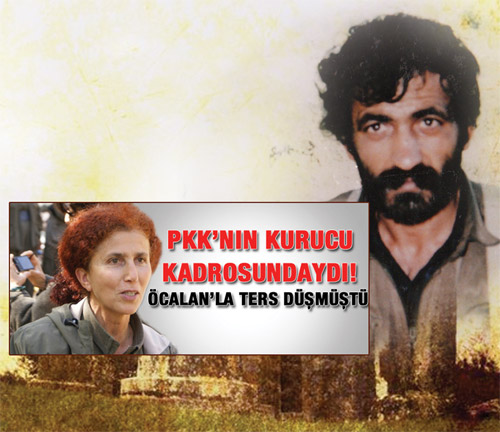 |
| Mehmet Sener from founding leaders cadre and his fiancée Sakine Cansiz were executed by order of the PKK leaders. "SHE WAS ONE OF THE FOUNDERS OF THE PKK! SHE COLLIDED WITH OCALAN" |
According to Şemdin Sakık, one of the founders of the PKK, it is none other than PKK leaders Abdullah Öcalan, Cemil Bayık, Murat Karayılan and Sabri Ok who give the internal PKK execution orders. And if the targets are senior-level members or founders, the sole decision for executions lays with Öcalan. 79
The details in Sakık’s confessions are spine-chilling. He reveals that a militant doesn't even need to be accused of spying to be killed, and that he could be killed only for the reason that a dead militant is preferable to the PKK over a wounded one:
... we chose tens of militants getting shot over one militant running away because the dead ones did not harm, but helped, the PKK. Their brothers, families and next of kin became attached to the organization. It was for this destructive effect that in 1992 Cemil Bayık, one of the current leaders of the organization, had 17 wounded militants shot by a firing squad in a cave in the Haftanin valley, just to make sure they didn’t get caught by the security forces. Furthermore, making sure that militants weren’t captured alive was a policy of the organization and similar incidents happened quite frequently because death was regarded as a gain, while getting captured as a loss. Even the wounded ones getting captured by the state was not tolerated. According to the organization, the biggest crime one could commit was getting captured alive by the state and furthermore benefiting from penalty reductions. 110
Hakkı Öznür, author of Derin Sol (Deep Left), reveals how PKK leader Öcalan ordered the execution of about one hundred PKK founders and central committee members, including Şahin Dönmez and Mehmet Şener (who was the fiancée of Sakine Cansız, killed in Paris), along with thousands of militants on the classic charges of “disobedience to the leadership,” “treachery,” being an “agent provocateur” or “spy”.
Ali Ömürcan, one of the founding members of the PKK, was questioned by Cemil Bayık in Lebanon and subsequently executed while Halil Kaya, who was made first deputy secretary general in the Third PKK Congress, was killed by firing squad upon Öcalan’s instruction.
Kani Yılmaz (Faysal Dumlayıcı), who played a part in the foundation of the PKK, was held responsible for not being able to find a place in Europe for Öcalan to hide before he was captured, and was therefore killed by a car bomb that two PKK terrorists planted on February 10, 2006. Yıldırım Merkit, another founding figure who was responsible for the Erzincan-Tunceli region, was declared a spy and co-conspirator and assassinated in Romania. Öcalan grew uneasy of the rising profile of Haki Karer, another PKK founding member, and Karer was killed in a coffee house in Gaziantep on May 18, 1977 in a suspicious attack. Çetin Güngör, who was responsible for the European region, criticized the activities of the administrators during a congress and was declared a spy and subsequently killed in Stockholm in 1984. Mehmet Çimen, known by the code name of Ali Rıza, served 11 years in Diyarbakır prison and later fell out with senior PKK official in Germany and was called to Syria. Upon the decision of the organization, he was killed by being drowned in a bathtub filled with acid.
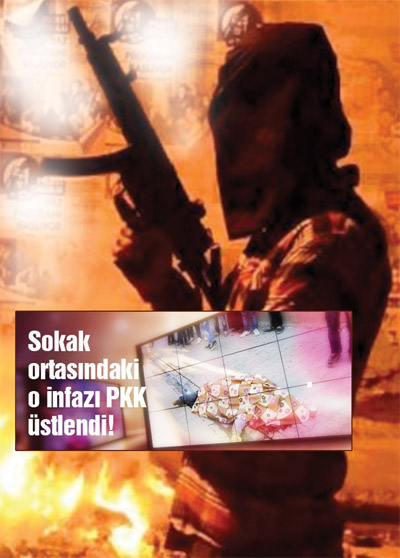 |
| Abdullah Budak was executed on 10th of November 2014 in the middle of the street in Cizre by the PKK. "PKK TOOK ON THAT EXECUTION RIGHT IN THE MIDDLE OF THE STREET!" |
The PKK killed the militants of differing socialist Kurdish organizations prior to September 12 Coup in Turkey, and destroyed all other organized Kurdish networks like Özgürlük Yolu (Freedom Way), Tekoşin, TKP, Beş Parçacı Grubu (Five-Parts Group), KUK, Halkın Kurtuluşu (People’s Salvation), Halkın Birliği (People’s Unity), Halkın Yolu (People’s Way), TİKP-Aydınlık (Enlightment), TİKKO, Dev-Yol, Kurtuluş Hareketi (Salvation Way) through massacres.
Aytekin Yılmaz, who served 10 years for being a PKK member, wrote a book entitled Yoldaşını Öldürmek (Killing Your Comrade), in which he detailed the PKK's internal executions. In this book, he said that the murders were later celebrated by PKK members by dancing. He reveals how brutal the PKK is when he says: “I saw that they were doing halay [a regional dance] in two instances. One was in 1990s, when the guerillas [PKK members] raided a precinct and killed 20 to 30 soldiers. It always seemed horrible to me. And the second time was when they did it after killing fellow comrades. And then they would distribute desserts to the ones in the wards. They did this when the person they killed was their friend just the day before! Can you believe these?” 111
İsmail Beşikçi also gives details about the people killed as a part of internal PKK executions and the situation of their family members:
There are hundreds of executions in the PKK like that of Mehmet Şener... Those whose daughters, sons were killed by their own friends, by the PKK, have been completely quiet, their lives have been shut down. There is no authority to go to for these families...112
When Abdullah Budak was killed on November 10, 2014 in Cizre in the middle of the street, the youth branch and so-called “public order unit” of the PKK claimed responsibility and said that Budak was executed because he was a spy. This, and tens of thousands of other murders, are turning the region into a sea of blood. These executions continue incessantly and the Kurdish people have to live with this horror on a daily basis.
The PKK has slaughtered many Kurds such as Mehmet Turan, Murat Bayraklı, Abdullah Kumral, Dilaver Yıldırım, Attorney Mahmut Bilgili, Mehmet Çimen, Resul Altınok and Sakine Cansız simply for opposing the policies of violence of Öcalan.
It is clear that the PKK uses its guns against its own militants too. Many militants are like hostages to this horrible situation. This is yet another proof that the PKK will never give up on its weapons as it knows perfectly well that if it does, it will lose the entirety of its leverage against the Turkish state and also lose its means of intimidating its own militants into compliance and obedience.
Footnotes
75. http://www.aljazeera.com.tr/al-jazeera-ozel/ kisanak-petrolden-pay-istiyoruz
76. Ümit Özdağ, PKK ile Pazarlık (Negotiating with the PKK), Kripto Yayıncılık, 2013, p. 252
77. http://www.zaman.com.tr/politika_pkk-ozerklik-ilan-ediyor_2200699.html
78. Cemal Temizöz, Siyasallaşan PKK Terörü (The Politicization of PKK Terror), Togan Yayınları, Bakırköy, February 2012, p. 531
79. 21. Yüzyıl Türkiye Enstitüsü (21st Century Turkey Institute), Special Report, PKK'nın kontrolündeki Diyarbakır (Diyarbakır under PKK control), September 2013, p. 4
80. Ibid., p. 4
81. Stratejik Düşünce Enstitüsü (Strategic Thought Institute - STI) Analysis, KCK Örgütlenme Modeli ve Amacı (The KCK Model and Aim), July 2011, p. 12
82. Carl J. Friedrich and Zbigniew K. Brzezinski's‘ Totalitarian Dictatorship and Autocracy - Stratejik Düşünce Enstitüsü (Strategic Thought Institute - STI) Analysis, KCK Örgütlenme Modeli ve Amacı (The KCK Model and Aim), July 2011, p. 12
83. Stratejik Düşünce Enstitüsü (Strategic Thought Institute - STI) Analysis, KCK Örgütlenme Modeli ve Amacı (The KCK Model and Aim), July 2011, p. 15
84. http://gundem.bugun.com.tr/m/NewsDetail.aspx? id=125783
85. Stratejik Düşünce Enstitüsü (Strategic Thought Institute - STI) Analysis, KCK Örgütlenme Modeli ve Amacı (The KCK Model and Aim), July 2011, p. 29
86. Tuğçe Tatari, Anneanne Ben Aslında Diyarbakır'da değildim (Grandmother, I was Not in Diyarbakır), Doğan Kitap, 2015, p. 179
87. Stratejik Düşünce Enstitüsü (Strategic Thought Institute - STI) Analysis, KCK Örgütlenme Modeli ve Amacı (The KCK Model and Aim), July 2011, p. 29
88. Gerek yok ki… (There is no need…), Ahmet Altan, Daily Taraf, 22nd October 2011, http://www.taraf. com.tr/yazilar/ahmet-altan/gerek-yok-ki/18259/
89. Burhan Semiz, KCK'nın Din Stratejisi (The Religious Strategy of the PKK and KCK), pp. 201-204
90. http://www.sabah.com.tr/Gundem/2011/12/25/ ocalan-peygamber-evi-kabe#
91. http://www.dogruhaber.com.tr/Haber/Ocalani-Peygamber-ilan-ettiler-122778.html
92. http://www.serxwebun.org/index.php?sys=nave rok&id=63
93. http://haber.sol.org.tr/yazarlar/ilker-belek/karma-egitim-cinsel-gelisim-82967
94. http://www.ensonhaber.com/kck-osman-baydemiri-aglatti-2012-04-20.html
95. http://www.radikal.com.tr/yazarlar/murat_yetk in/kurt_sureci_secim_ikileminde-1221690
96. Abdullah Öcalan, Demokratik Uygarlık Manifestosu, (Manifesto for a Democratic Civilization, Book 5), V. book, 2013, p. 16
97. http://tr.wikisource.org/wiki/KCK_S%C3%B6zle %C5%9Fmesi
98. http://haber.star.com.tr/yazar/mardin-kantonundan-yaziyorum/yazi-1029450
99. http://www.dirilispostasi.com/orgut-uc-bin-cocugu-kacirdi/
100. http://haber.star.com.tr/yazar/secim-sahasindan-bildiriyorum/yazi-1025861
101. 21. Yüzyıl Türkiye Enstitüsü (The 21st Century Turkey Institute), Special report, PKK'nın kontrolündeki Diyarbakır (Diyarbakır under the control of the PKK), September 2013, p. 5
102. "Urban Warfare Escalates in Turkey's Kurdish-Majority Southeast," The Wall Street Journal, Ayla Albayrak, http://www.wsj.com/articles/urban-warfare-escalates-in-turkeys-kurdish-majority-southeast-1440024103
103. http://www.haberturk.com/yazarlar/fatih-altayli/902652-eski-turkiyeye-donus
104. http://www.milliyet.com.tr/sabri-ok-silahsizlanma-gundem-1973869/
105. Şemdin Sakık, Çözüm Süreci (The Solution Process), Alter Yayınları, 2014, pp. 100-103
106. Ibid., pp. 116-117
107. Ibid., p. 117
108. http://www.milliyet.com.tr/kemal-burkay-in-bu-aciklmalari-pkk-yi-cileden-cikaracak/siyaset/ siyasetdetay/27.02.2012/1508468/default.htm
109. Şemdin Sakık, Çözüm Süreci (The Solution Process), Alter Yayınları, 2014, pp. 73-74
110. Ibid., p. 172
111. http://t24.com.tr/haber/pkk-dhkp-c-tikko-yoldaslarini-nasil-oldurduler,267458
112. http://t24.com.tr/haber/pkk-dhkp-c-tikko-yoldaslarini-nasil-oldurduler,267458
- Introduction
- Chapter 1: Evangelicalism and the Middle Eastern Axis
- Chapter 2: A century-old objective: The desire to break up the Middle East
- Chapter 3: The Desired Outcome of The Treaty of Sevres: Great Kurdistan (1/2)
- Chapter 3: The Desired Outcome of The Treaty of Sevres: Great Kurdistan (2/2)
- Chapter 4: The perception of PKK in the West
- Chapter 5: What kind of danger is Turkey facing?
- Chapter 6: How should Turkey act?
- Chapter 7: Understanding our Kurdish brothers’ problems
- Chapter 8: The time for the salvation of the world is near
- Conclusion
